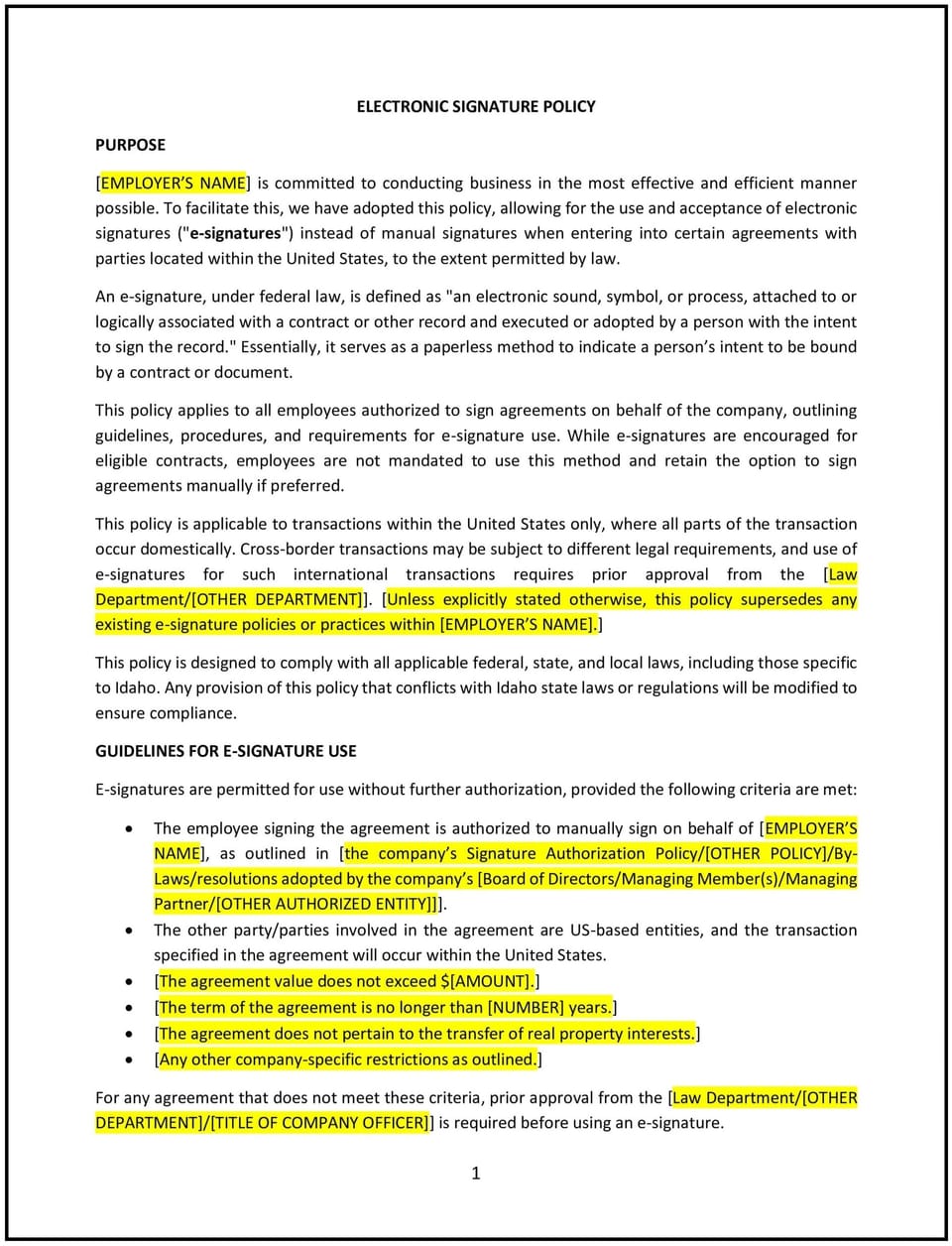Electronic signature policy (Idaho): Free template

Electronic signature policy (Idaho)
An electronic signature policy helps Idaho businesses establish guidelines for using electronic signatures in place of handwritten signatures on documents. This policy outlines the types of documents that can be signed electronically, the technologies and processes to be used, and the legal validity of electronic signatures. It reflects the business’s commitment to efficiency, security, and alignment with state and federal laws.
By implementing this policy, businesses can streamline document processes, reduce paperwork, and ensure the authenticity and integrity of signed documents.
How to use this electronic signature policy (Idaho)
- Define electronic signatures: Specify what constitutes an electronic signature, such as a typed name, digital signature, or other electronic identifiers.
- Outline acceptable use: Provide guidelines for the types of documents that can be signed electronically, such as contracts, agreements, or internal forms.
- Specify technology requirements: Describe the technologies or platforms to be used for electronic signatures, ensuring they meet security and legal standards.
- Address legal validity: Clarify that electronic signatures are legally valid under Idaho and federal laws, such as the Electronic Signatures in Global and National Commerce Act (E-SIGN Act) and the Uniform Electronic Transactions Act (UETA).
- Establish security measures: Include protocols for verifying the identity of signers and ensuring the integrity of electronically signed documents.
- Communicate expectations: Ensure employees understand the policy, including the proper use of electronic signatures and the importance of maintaining document security.
- Review and update: Regularly review the policy to ensure it remains aligned with technological advancements, legal requirements, and business needs.
Benefits of using this electronic signature policy (Idaho)
This policy provides numerous benefits for Idaho businesses:
- Improves efficiency: Electronic signatures streamline document processes, reducing the time and effort required for signing and approvals.
- Reduces paperwork: By adopting electronic signatures, businesses can minimize the need for physical documents and storage.
- Enhances security: The policy ensures that electronic signatures are used with secure technologies and protocols, protecting against fraud or tampering.
- Supports remote work: Electronic signatures enable employees to sign documents from anywhere, facilitating remote work and collaboration.
- Provides clarity: A well-defined policy ensures consistent use of electronic signatures and reduces potential misunderstandings.
- Aligns with legal standards: The policy helps businesses adhere to Idaho and federal laws regarding electronic signatures.
- Encourages accountability: The policy holds employees accountable for using electronic signatures responsibly and securely.
Tips for using this electronic signature policy (Idaho)
- Communicate the policy effectively: Share the policy with employees during onboarding, training sessions, and through internal communications to ensure awareness.
- Train employees: Provide training on the policy, the proper use of electronic signatures, and the importance of document security.
- Use secure platforms: Implement reliable and secure electronic signature technologies that meet legal and industry standards.
- Monitor usage: Regularly review the use of electronic signatures to ensure compliance with the policy and address any issues promptly.
- Document processes: Maintain records of electronically signed documents, including timestamps and verification details, for accountability.
- Review the policy regularly: Update the policy as needed to reflect changes in technology, legal requirements, or business needs.
- Lead by example: Encourage leadership to model adherence to the policy and demonstrate a commitment to secure and efficient document processes.
Q: Why should Idaho businesses have an electronic signature policy?
A: An electronic signature policy helps businesses streamline document processes, reduce paperwork, and ensure the legal validity and security of signed documents.
Q: What types of documents can be signed electronically?
A: Businesses should specify which documents can be signed electronically, such as contracts, agreements, or internal forms, as outlined in the policy.
Q: What technologies should businesses use for electronic signatures?
A: Businesses should use secure and reliable electronic signature platforms that meet legal and industry standards, as specified in the policy.
Q: Are electronic signatures legally valid?
A: Yes, electronic signatures are legally valid under Idaho and federal laws, such as the E-SIGN Act and UETA, as long as they meet certain requirements.
Q: How should businesses ensure the security of electronic signatures?
A: Businesses should implement protocols for verifying signer identity and maintaining document integrity, as outlined in the policy.
Q: How should employees use electronic signatures?
A: Employees should follow the guidelines in the policy, including using approved technologies and maintaining document security.
Q: How often should the policy be reviewed?
A: The policy should be reviewed annually or as needed to reflect changes in technology, legal requirements, or business needs.
This article contains general legal information and does not contain legal advice. Cobrief is not a law firm or a substitute for an attorney or law firm. The law is complex and changes often. For legal advice, please ask a lawyer.


